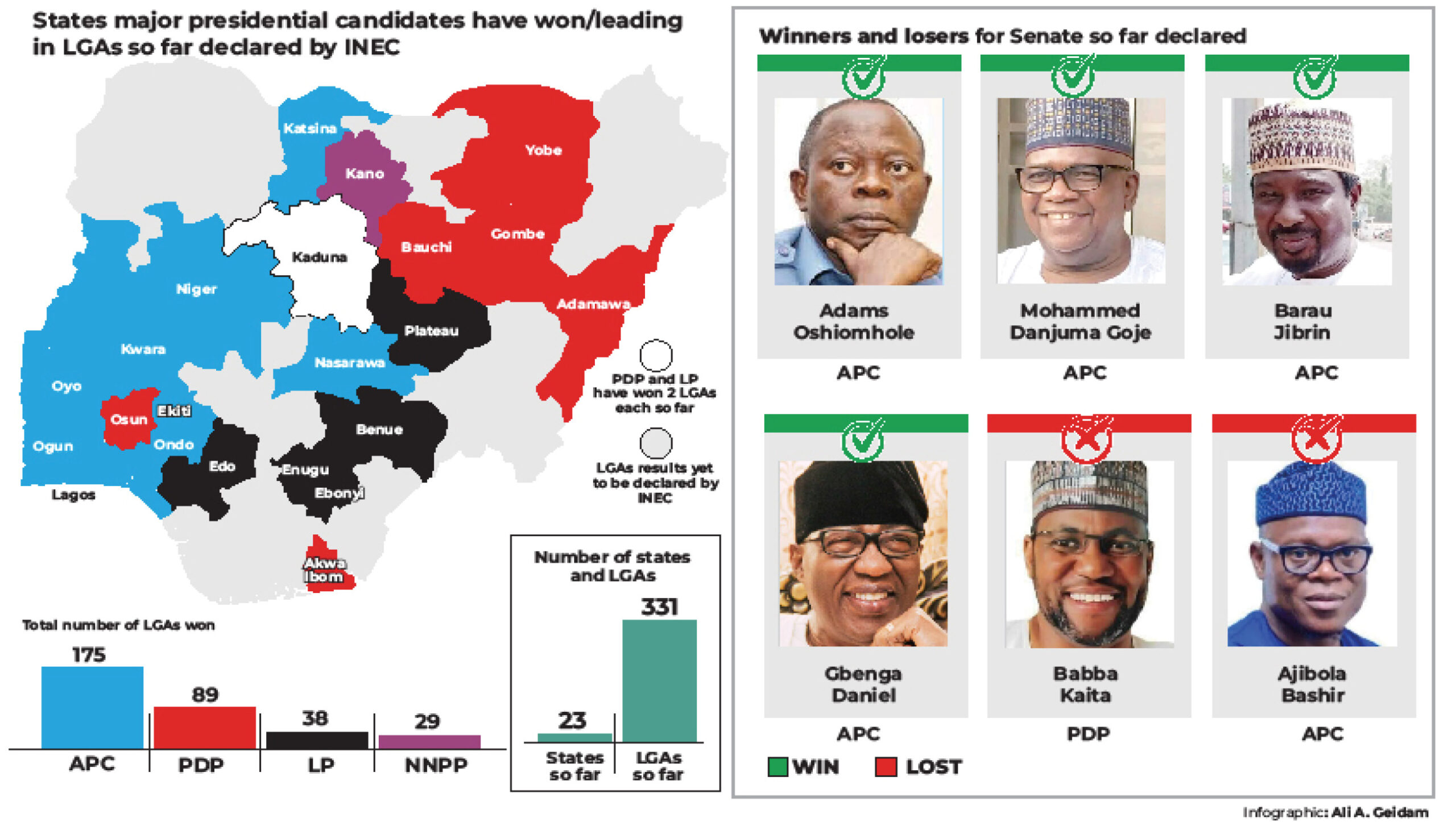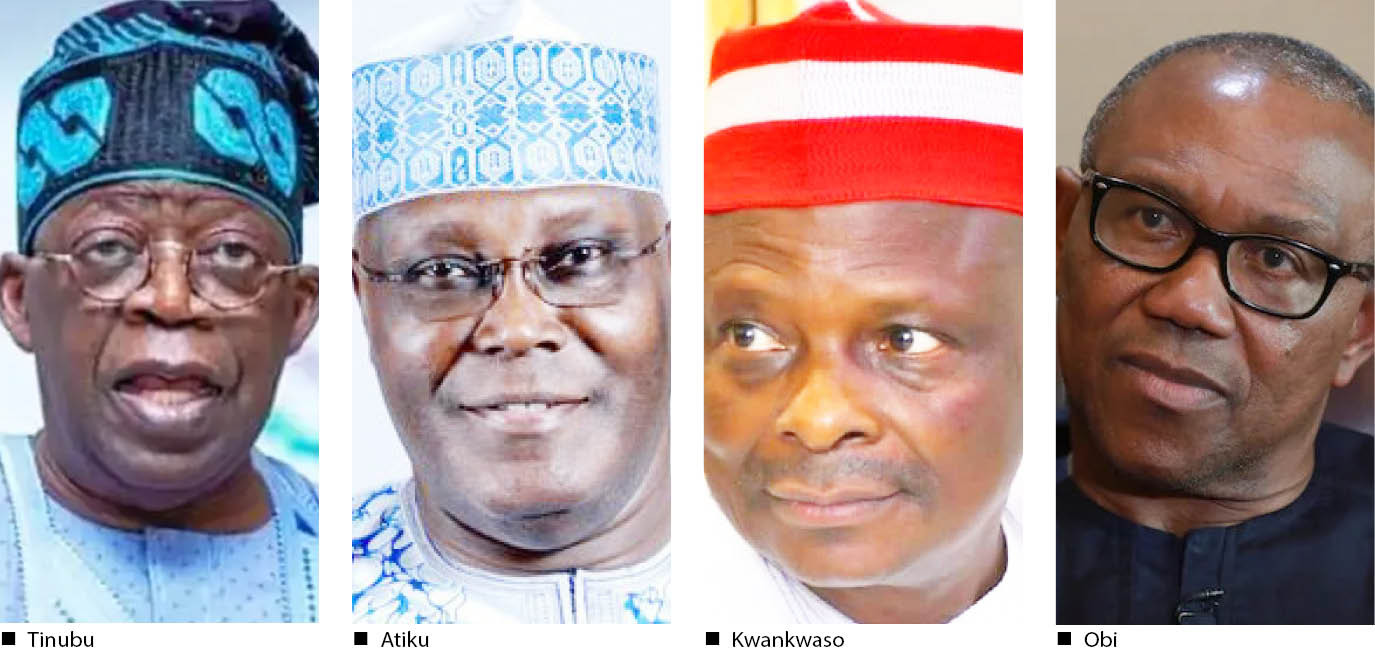Votes spread: Tinubu, Atiku neck and neck as Obi trails
The presidential candidate of the ruling All Progressives Congress (APC), Asiwaju Bola Tinubu, and his counterpart in the Peoples Democratic Party (PDP), Atiku Abubakar, would most likely meet the constitutional requirement of 25 per cent of total votes cast in 24 states and the Federal Capital Territory (FCT). This is based on the results so […]

The presidential candidate of the ruling All Progressives Congress (APC), Asiwaju Bola Tinubu, and his counterpart in the Peoples Democratic Party (PDP), Atiku Abubakar, would most likely meet the constitutional requirement of 25 per cent of total votes cast in 24 states and the Federal Capital Territory (FCT).
This is based on the results so far released at the state collation centres of the Independent National Electoral Commission (INEC).
The candidate of the Labour Party (LP), Peter Obi, is trailing.
Section 134 (2) of the Nigerian Constitution requires the candidate in a presidential race to get at least 25 per cent of the votes in two-thirds of the states in order to be declared winner.
- Election: No corps member beaten to death in Abuja — NYSC
- Votes spread: Tinubu, Atiku neck and neck as Obi trails
An analysis of the results trickling in so far showed that Tinubu will get 25 per cent in at least 17 of the 19 northern states.
He is however likely to have issues in Taraba and Plateau states.
The Asiwaju will get 25 per cent in all the six states in the South West.
In the South East, he might not get the required 25 per cent in all the five states.
However, he is likely to meet the 25 per cent threshold in Edo (South South) and the FCT, thereby giving him one state above the required 24 states to win the presidency.
Atiku is likely to get the 25 per cent requirement in 17 states in the North with the exception of Kano and Benue based on results released in the states so far.
He is also likely to get the required 25 per cent in five of the six states in the South West with the exception of Lagos.
In the South East, like Tinubu, Atiku might not meet the requirement in the five states of the zone.
Analysis shows that he might get the 25 per cent requirement in Edo and Delta states in the South South in addition to the FCT, giving him the total of 24 states required.
Peter Obi will get the required 25 per cent in the 11 states of the South East and South South, as well as in the North Central states of Benue, Nasarawa and Plateau.
He is also expected to get 25 per cent in Adamawa and Taraba in North East; in addition to Lagos and FCT to end up with 18 states as he might not make any headway in the North West.
However, Senator Rabiu Kwankwaso of the New Nigeria Peoples Party (NNPP) is not expected to win in any other state apart from Kano.

How they fared in states
As Nigerians look forward to the final declaration of Saturday’s presidential and National Assembly elections by INEC, results collated at the state level as of press time showed the performance of the leading flag bearers in some LGAs.
This is even as INEC yesterday adjourned the collation of results at the national collation centre in Abuja to today, after declaring the presidential result for Ekiti State which was won by Tinubu.
INEC state Collation Officer and Vice Chancellor of the Federal University of Health Sciences, Ila Orangun, Osun State, Professor Akeem Olawale Lasisi, said the APC polled 201,494 votes to win the state, while, Atiku got 89,654 votes to come second.
Obi recorded 11,397 votes to come third.
Elsewhere, Tinubu won in 18 LGAs in Ogun State.
The declared results indicated that Tinubu was leading his opponents with 251,102 votes.
Atiku on the other hand scored 104,118 votes while Obi got 48,226 votes.
The local government areas won by Tinubu include Remo North, Ikenne, Egbado South, Ewekoro, Abeokuta North, Ijebu North and Ijebu North-East.
Others are Imeko Afon, Odeda, Egbado North, Ijebu-Ode, Sagamu, Ipokia, Odogbolu, Abeokuta South, Ogun Waterside and Ijebu East. However, results from the remaining three local government areas of Ifo, Obafemi Owode and Ado-Odo Ota were still been expected for collation.
Atiku leads Tinubu in 11 Bauchi LGAs
In Bauchi, our correspondent reports that Atiku was leading in 11 of the 20 local government areas of the state where results were collated.
The results were collated by the Bauchi State Returning Officer for the presidential election, Professor Ahmed Sarki Fagam, at INEC office in Bauchi.
The LGAs won by Atiku are Warji, Bogoro, Dass, Jama’are, Dambam, Giade, Darazo, Kirfi, Katagum and Ganjuwa.
Tinubu leads Atiku, Obi, Kwankwaso in Niger
In Niger State, the presidential results from 10 local governments out 25 LGAs were declared yesterday.
Tinubu scored 143,404 votes and was followed by Atiku who pulled 125,292 votes.
Tinubu led in Wushishi, Rafi, Gbako, Gurara, Bosso, Lavun and Paikoro LGAs while Atiku led in Katcha, Mokwa and Edati respectively.
Obi leads in Ebonyi, Tinubu in Kwara
In Ebonyi State, Obi was leading in all the 13 LGAs according to the results declared yesterday.
In Kwara State, Tinubu won seven out of the 16 LGAs so far released by INEC and Atiku came second.
The seven councils won by Tinubu are Asa, Isin, Offa, Oke- Ero, Ilorin East, Ekiti and Irepodun.
Obi leads in 5 Edo LGs
The Edo State Collation Officer and Vice Chancellor, University of Uyo, Prof. Nyaudoh Ndaeyo, yesterday released the results of the presidential election in five local governments of the state – Igueben, Esan Central, Esan North East, Egor and Esan South East.
From the results, LP garnered 86,285 votes followed by APC with 18,219 votes while PDP came third with 15040 votes.
Atiku leads in 11 Adamawa LGAs
In Adamawa, which is his home state, Atiku was leading in 11 of the 21 local government areas in the state.
Going by the declared results, Atiku was leading in Lamurde, Shelleng, Toungo, Guyuk, Ganye, Mayo Belwa, Fufore, Song, Numan, Demsa and Yola South.
Tinubu won only in Girei LGA.
INEC rules out sabotage
INEC said yesterday that the problems it had with its results Viewing Portal (IReV) were not an act of sabotage.
Its National Commissioner and Chairman of, Information and Voter Education Committee, Festus Okoye, who stated this in Abuja on Sunday, acknowledged that the commission was aware of challenges with the IReV.
“The commission regrets this setback, especially because of the importance of IReV in our results management process.
“The problem is totally due to technical hitches related to scaling up the IReV from a platform for managing off-season state elections, to one for managing nationwide general elections.
